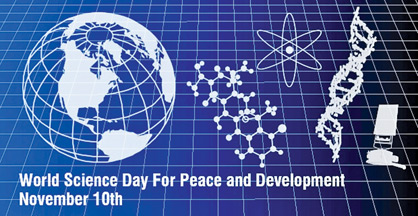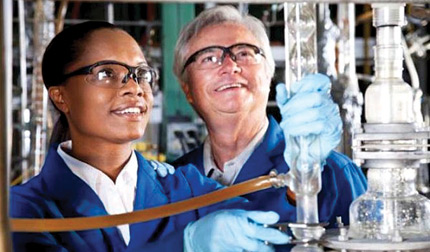|
 World Science Day : World Science Day :
Global search for peace and development
By Husna Inayathullah
The World Science Day for Peace and Development (WSDPD) is held
annually on November 10 to raise awareness of the benefits of science
worldwide. The WSDPD, also known as World Science Day was proclaimed by
the UNESCO General Conference in 2001.
This day is celebrated all over the world to recall the commitment
made at the UNESCO-ICSU World Conference on Science (Budapest 1991). The
theme for this year is "Quality Science Education: ensuring a
sustainable future for all."
The purpose of the World Science Day for Peace and Development is to
renew the national as well as the international commitment to science
for peace and development and to stress the responsible use of science
for the benefit of society.
The World Science Day for Peace and Development also aims at raising
public awareness of the importance of science and to bridge the gap
between science and societies.
Commitment
The organisation of a focused event related to the commitment to
science and society was one of the positive outcomes of the 1999 World
Conference on Science in Budapest.
It was considered an opportunity to reaffirm each year the commitment
to attaining the goals proclaimed in the Declaration on Science and the
Use of Scientific Knowledge and to follow up the recommendations of the
Science Agenda: Framework for Action.
Award-winning science writer Nalaka Gunawardene who counts over 25
years of national and international experience and serves as co-chair of
the recently established National Coordinating Council on Science for
all in Sri Lanka expressed his views regarding World Science Day. He
explained the Day's relevance and values.
Role
"World Science Day aims to ensure that everyone is kept informed of
new developments in science, and the role scientists in society is
understood and valued. The notion of 'Science for All' is not confined
to scientific subjects studied in school or university. Science is much
more than textbooks, laboratories and experts.
 "Some among us are drawn to studying science and technology in depth
and pursue careers in medicine, engineering or other specialised fields.
Sri Lanka certainly needs such highly skilled persons to transform the
economy and society. "Some among us are drawn to studying science and technology in depth
and pursue careers in medicine, engineering or other specialised fields.
Sri Lanka certainly needs such highly skilled persons to transform the
economy and society.
Beyond this, however, every citizen needs a certain minimum knowledge
and understanding of science and technology to lead productive and safe
lives today. Without it, we can get easily confused, sidelined or
exploited by various scams.
Consider a few recent headline-making developments" he said.
One would wonder how far we have proposed in science based control
measures.According to Gunawardene, an international health conference
held in Colombo heard that no malaria cases had been reported in Sri
Lanka since October 2012. It suggests that we have probably eliminated
the ancient disease from our island. Science based disease surveillance
and control measures were responsible for this feat in public health.
"Yet there is no time to rest, as other mosquito borne diseases pose
new threats, he says. "Since 1988, dengue fever (DF) and dengue
haemorrhagic fever (DHF) epidemics have been regular occurrences in Sri
Lanka, which is among the 30 most dengue endemic countries.
Dengue is preventable and evidence shows it can be contained. Once
again we need scientific research to inform health policies and control
measures.
Koslanda
"The Koslanda landslide on October 29 destroyed an entire settlement,
instantly burying many innocent people and making hundreds more
homeless. That was a national tragedy, especially as the hazard was
identified by scientists at the National Building Research Organisation
(NBRO) who had repeatedly warned the people at risk to relocate.
"Alas, that did not happen for socio-economic reasons. A key lesson
of Koslanda is that hazard information and warnings need timely and
effective communication. To be effective, they need to be accompanied by
viable alternatives to those at risk.
We often read media reports that can be scary. We hear about
pesticide residues in our food, the rising number of road traffic
accidents, and the danger of digital identity theft. Some basic
scientific knowledge and technical skills become essential survival
tools in the 21st century. Science cannot be left to scientists alone.
We can understand this with a sporting analogy. Our national passion
of cricket is played professionally by a handful of men and women who
make up the national teams and pools. But practically all 20 million
Lankans know enough about cricket to follow and appreciate the game.
Method
Similarly, we have a few thousand professionals practising or
teaching science and technology for a living. The rest of society also
needs to know at least the basic concepts - and limits - of science.
For example, the scientific method involves questioning and
investigating before accepting anything. A healthy dose of scepticism is
very useful to safeguard ourselves from superstitions and increasingly
sophisticated - but not always honest - product advertising.
Speaking about the Coordinating Secretariat for Science, Technology
and Innovation (COSTI, website: http://costi.gov.lk) which was set up in
2013 under the Senior Minister of Science and Technology, Gunawardene
says it has recently set up a National Coordinating Council on Science
for All in Sri Lanka. Its mandate is to empower Lankans of all ages and
walks of life with science knowledge to enable them to make informed
decisions in everyday life.
The Council wants to play a catalytic role, inspiring media,
education and professional institutions to promote science communication
as an essential survival skill for modern times. It will collaborate
with such message 'multipliers' who can help reach large numbers of
people quickly. A national policy on science communication is to be
drawn up to guide future activities.
American astronomer Carl Sagan (1934 - 1996) was at the forefront in
promoting science for its sense of wonder and also for countering
pseudoscience. As he used to say, "Our species needs, and deserves, a
citizenry with minds wide awake and a basic understanding of how the
world works."
The rationale of celebrating a World Science Day for Peace and
Development has its roots in the importance of the role of science and
scientists for sustainable societies and in the need to inform and
involve citizens in science. In this sense, a World Science Day for
Peace and Development would offer an opportunity to show the general
public the relevance of science in their lives and to engage them in
discussions.
Such a venture would also bring a unique perspective to the global
search for peace and development.
Partners
The first World Science Day for Peace and Development was celebrated
worldwide on November 10, 2002 under UNESCO auspices. The celebration
involved many partners, such as governmental, intergovernmental and
Non-Governmental Organisations, UNESCO National Commissions, scientific
and research institutions, professional associations, the media, science
teachers and schools.
The United Nations Educational, Scientific and Cultural Organisation
(UNESCO) works with people, government agencies and organisations to
promote the WSDPD each year. The WSDPD celebrations include: Open days
to highlight science's important role in peace and development.
Classroom discussions to emphasize how science and technology affect
daily life.
Distributing the WSDPD posters throughout tertiary institutions,
school campuses, and public venues.
Arranged science museum visits to commemorate the day. Visits to
local schools on careers in science or scientific presentations.
In the past several governments used World Science Day to publicly
affirm their commitment to increased support for scientific initiatives
that help society, as well as launch new science policy programs
together with scientific institutions, civil society, universities and
schools. The WSDPD is a global observance and not a public holiday.
Various images promoting science and technology are seen in World
Science Day posters. The UNESCO logo is also seen on promotional
material associated with the day. The logo features the words "UNESCO"
pictured as part of a temple building or structure. The words "United
Nations Educational, Scientific and Cultural Organization" are presented
underneath this image. |

